#thriller book review
Text
FINAL GIRLS by Riley Sager
Damn, he has such a riveting way with words. The way he crafts his story is so engaging and fascinating, always egging me on to bring my ereader to the toilet even when I want to take a poo. That's Riley Sager.
I started off this book being afraid that I was setting myself up to be disappointed, I was coming off his last book THE LAST TIME I LIED, which I thoroughly enjoyed. Also the way he used the term 'Final Girls' made me cringe... like I get that it was the media trying to glamourise their survival but then why did the 'Final Girls' themselves attach themselves to the name? It's a tad bit corny but that's one of the most jarring moments in the book.
I didn't like the main character, but she was such an intriguing person to read about and from. I love when Sager makes me doubt who the actual murderer is, even the main character.
I fully did not expect it to be Coop. But I also fully welcome it. It was such a surprising and well structured twist that had a great set-up for a romance turned ohmygodhe'sakiller situation. I also feel ashamed as does the main character for accusing Tina for being the murderer. I feel so awed that Sager made me afraid of Tina instead of being afraid of the actual horrible person. What a great, excellent read that I have not enough words to enunciate.
5/5 stars
3 notes
·
View notes
Text
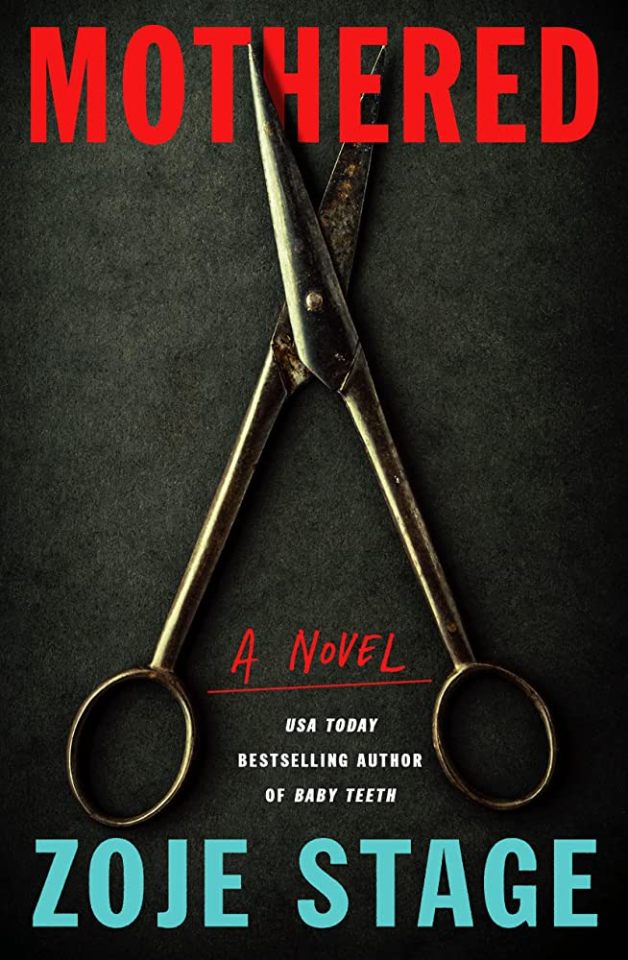
2 ⭐ - sorry if the review sounds mean, I got infected with the nightmare vegan evil disease
SUMMARY
Grace isn’t exactly thrilled when her newly widowed mother, Jackie, asks to move in with her. They’ve never had a great relationship, and Grace likes her space—especially now that she’s stuck at home during a pandemic. Then again, she needs help with the mortgage after losing her job. And maybe it’ll be a chance for them to bond—or at least give each other a hand.
But living with Mother isn’t for everyone. Good intentions turn bad soon after Jackie moves in. Old wounds fester; new ones open. Grace starts having nightmares about her disabled twin sister, who died when they were kids. And Jackie discovers that Grace secretly catfishes people online—a hobby Jackie thinks is unforgivable.
When Jackie makes an earth-shattering accusation against her, Grace sees it as an act of revenge, and it sends her spiraling into a sleep-deprived madness. As the walls close in, the ghosts of Grace’s past collide with a new but familiar threat: Mom. (Source)
Review below the cut. Warning, this review will contain spoilers.
REVIEW
I'm going to be honest: there's not a lot in Mothered that I particularly enjoyed. The pacing, story, prose, and characters were not at all what I want from a horror book. There were exactly two characters I liked seeing on the page (which is stretching it, since one of them is a cat) and one horror moment that I found to be memorably creepy. While it was a fast read, if I hadn't gotten this book through Netgalley I almost certainly would have DNF'd it pretty quickly (and that is if I had picked it up at all, since it would have failed the page 99 test).
STRUCTURE AND PROSE
As it opens and ends the story, I may as well discuss the prologue and epilogue. These two follow a therapist named Silas, who claims he is excited to work with an unnamed patient due to the brutality of the murder she committed. It's obfuscated which of the two women, Jackie or Grace, committed homicide. (Keep a pin in this as we'll be returning to it.) As the prologue concludes, we are told that “[Silas’s] job, as it often was, would be to filter the drop of truth from a waterfall of magical thinking” (13). This setup, with Silas being directly indicated to be a character who would engage with the narrative about to be told, indicates that the main bulk of the narrative would be in a narrative frame. Grace would speak to Silas to confess her life story and convince him of her point of view (a la Frankenstein, the reason why I love a good frame narrative). This is not the case. Rather than being nested, the narrative is delivered by a close third person narrator, with Grace’s story bookended by Silas’s. The prologue and epilogue might as well have not been there; they add little to nothing to the narrative. All that was achieved was disappointment.
The completely normal third person narration was. A Choice. Look, I’m a fan of close third person. It works fine, but it was a disappointing choice, espcecially after that prologue setup. Grace as a character does have interesting elements to her that I feel would have been far more interesting to me as a reader had we navigated the narrative directly through her eyes.
Speaking of characters, wasted potential is the name of the game in Mothered. Characters have features and traits, but aren’t well-rounded. Part of that issue is with the dialogue; it is middling at best, and stilted, awkward, or shallow at worst. Additionally, there's not as much of it as one would think for a story about a toxic mother-daughter relationship stuck in close quarters.
The standout issue with the characters for me is that they are their role in the story before they are a character. Silas is not a character who is a therapist, he is the therapist character (and, upon a re-read of the prologue, is I think supposed to be some sort of reader stand-in? Which I also am not a fan of). Miguel isn’t a character who is the main character’s best friend; he is the best friend character (worse, he falls into the gay best friend trope). Jackie isn’t a character who is Grace’s mother; she is the mother character. Grace, by virtue of being the protagonist, somewhat escapes this issue, but still is not well-rounded or developed by any means. She’s supposed to be an unreliable narrator, something I normally love, but in her found to be unengaging.
Grace as a protagonist could have been interesting; she has a lot of childhood trauma, but does genuinely try to help those around her. She’s kind towards her friend Miguel and drops everything to help him when he gets sick. While has the bizarre hobby of catfishing women (which she calls damsels) online, she describes it as intentionally trying to help build these women’s self esteem and help them improve their lives. The interesting elements of her, however, aren't really fleshed out enough. The damsels plotline especially had a lot of very interesting potential that’s completely unfulfilled. It really only exists so that Grace has something to feel guilty about and hide from her mother.
The pacing. God, the pacing. The pacing was strange, due to the fact that a bulk of the narrative is dream sequences. The narrative jumps forward in time rather suddenly in order to dump the reader into a dream without indication. Not only does this make the pacing feel jerky and inconcistant, it also means that the dream segments are also far less effective. While suddenly jumping from reality to a dream can be a valuable strategy because it puts both the reader and the character into a state of uncertain reality, most of the time it did not work in Mothered. The only time I did find it effective and memorable was the first; after that, since I knew what the author was trying to pull, the strategy was ineffective because I knew it was a dream, even if Grace did not.
The pacing during the non-dream segments was jerky as well. It often felt like the narrative was just trying to hurry to the next dream sequence. For example, chapter fourteen ends with Grace texting her best friend Miguel; chapter fifteen jumps to her having been hired by her old boss and visiting the new salon space. From that first paragraph, it's obvious that it's a dream. As a result, the non-horror section of the dream dragged on for far too long (since the conversation the characters was having was not only not real but also completely banal) while the horror section of it was not horrifying (as the physical danger, social rejection, and reality break Grace was experiencing was obviously just a dream). During most dream sections, especially during the second half of the book, I was bored.
For a mystery/thriller novel, Mothered is not very mysterious or thrilling. While there is certainly a hidden past tragedy that is eventually revealed, the actual reveal is... kind of boring. The narrative takes, in my opinion, the most uninteresting route. In the prologue, Silas muses that the case is “a good puzzle… one that look[s] on the surface like the gory movies he still so loved” (13). But this isn’t a puzzle. All the answers are spoonfed to the reader, and if the narrative makes an attempt to hide it, it does a terrible job.
One example of a very unmysterious mystery is the intentional obfuscation of who killed who in the prologue. My thought process during the first half of the novel was this:
A) Because the narrative follows Grace in close third person and
B) never follows Jackie,
that would normally indicate to me that
C) Grace, as the POV character, will be the surviving party.
However, because the identity of the patient in the first chapter is intentionally and carefully obfuscated from the reader, then
A + B might not equal C, but instead equal either
D) an upset of expectations (for example, Jackie killing Grace)
or
E) a third act twist revealing a previously unknown actor or plot element that reveals that the killer, the victim, Grace, and Jackie are in a more complicated configuration than first presented.
As I continued reading, it became clear to me that the narrative was not going to pull anything that interested. Despite this, I held out hope that the final chapters would have some kind of twist. That hope was futile. That setup of not knowing who dies is never cashed out. It just follows the most basic, obvious route: Grace is the protagonist, and because she is a protagonist, she can’t die so she has to be the murderer. Why bother to intentionally hide who kills who and then just not do something interesting? Especially when that problem is directly presented as being a puzzle!
Speaking of basic, the prose in general was boring. It’s all very direct and blunt, which can sometimes be a fantastic way to write a horror/thriller, but it just didn’t work for me here. The prose relies so heavily on telling over showing I felt as though the narrative was spoonfeeding me. Look, I don’t always need purple-literary-Romantic-big-words-long-sentences prose to enjoy a novel, but I do need something to chew on. If I’m not finding that in the structure, characters, horror elements, or central mystery, then by god at least give me some chewy prose.
THE DREAMS
I love dreams in horror. Exploring unreality, watching the line between waking and dreaming blur, having one encroach into the other. I love it all. Therefore, believe me when I say that the premise of incorporating horrible nightmares into a horror story isn't the issue. The issue with Mothered’s dreams was the execution.
First off: the horror elements were almost completely restricted to dreams. Although there were one or two moments of horror that I found genuinely intriguing, memorable, or creepy (for example, the "Mona needs a calfskin bag" dream), most of the rest of them were tropey, predictable, or overdone. While I bought that these dreams were upsetting for the character, they were not particularly upsetting to me. At some point it just got old. The use of dream horror is, to me, something that has to be done subtly, carefully, and sparingly, especially when we have a protagonist presented as unreliable. It's none of those things in Mothered.
The few horrifying elements outside of dreams are hallucinations. Grace dismisses them as such pretty quickly, and the hallucinations themselves fail to be credible from the get-go because they aren’t believably slotted into Grace’s reality. Horror-wise they aren't even good ones; they're even more tropey than the dreams. Even the horror of Grace and Jackie’s toxic relationship and the childhood trauma was restricted to these dreams as well; while there were some good moments of toxicity, gaslighting, or emotional manipulation in the waking world (such as Jackie letting Coco outside), almost all the detail and nuance we get about their history is dreamed.
Even the dreamed details about their past that do carry over into the real world aren’t fully fleshed. For example, during a dream, we are introduced to the paper dolls that Hope and her sister Grace used to play with. Later, while rummaging through her mother’s things, Grace finds her sister’s doll but not her own. While the doll imagery comes back in later dreams, that doll as a symbol of her mother’s favoritism and her relationship with Grace never beomes a point of conflict between the two. There isn’t ever a conflict about it, even when those dolls get brought up in conversation. I wanted a blow-out fight about those dolls; I wanted those dolls as an element of gaslighting; I wanted those dolls to be something that lead to a direct conflict that further develops Grace and Jackie’s current day relationship. But they don’t, and neither does much else.
The book’s summary claims that moving in together makes “old wounds fester” and “new ones open.” Sure, old wounds get re-opened, but calling what happens “festering” is a bit of a stretch. Grace is reasonably stressed about her mother being a bad roommate at times and Jackie occasionally apologizes for being a bad mother to her (though those conversations are rather surface level and nowhere near as toxic as they could have been). The only “new wounds” that open are are the ones that kill Jackie, with nary a new psychological wound in sight. As a result, the level of intensity between the two never quite reaches the fever pitch needed to make that final snap believable, narratively satisfying, and sharp.
One final complaint about the dreams I couldn’t shoehorn in elsewhere, so I’m shoehorning it in here. Sometimes (typically during dreams where Grace is reliving a childhood memory), Grace calls Jackie “Mommy.” I get why—as a child, she certainly did not call her mother by her first name—but it really did not work for me. Grace was a child forced to grow up too soon; I could buy her calling Jackie mom, maybe, but mommy? I certainly can’t see an overworked, exhausted Jackie referring to herself as “mommy” to her children. It was just weird and off-putting and out of place because it was so infantile, and, to be honest, came off as funny and unserious.
All that said, the dream scenes were far better written than the scenes that took place in reality. If they'd had better connective tissue and were more subtly handled, they could have been very effective. As it is, they're disappointing.
REALITY
From the premise, title, and setup of Mothered, I expected a book about a toxic mother-daughter relationship. I expected the narrative to explore that relationship in-depth and push the tension of it to its very limits. I wanted to watch them try to navigate an enclosed space. I wanted overtures of forgiveness turning nasty. I wanted conversations about Grace's childhood! I wanted them to have small disagreements that balloon out of control! I wanted a slow build of tension and complex hatred! I wanted gaslighting, damn it!
There were a few times—for example, the dinner party with Miguel—where there was subtle friction between actions and intention between Grace and her mother. Grace questions who her mother is now and how she relates to the woman who raised her. Jackie is the traditional boomer parent and brings up grandchildren. Miguel and Grace share the occasional bemused glance. It was a good early scene, which I thought would lead into later, complex, more dramatic scenes. For the most part, though, Grace and Jackie’s interactions were not all that complex, did not have subtextual implications, and were so direct and unnuanced it just was never all that interesting. While Grace certainly had reasons to doubt the reality around her, as a reader, I did not have any reason to believe what she was being told by her mother was untrue.
As mentioned earlier, most elements of the novel’s central mystery—what happened to Grace’s twin sister—were introduced in dreams, then (maybe) introdced into the waking world. The only piece evidence that emerged from a direct confrontation between Jackie and Grace was the box. While what it revealed wasn’t particularly funny, I couldn’t take the contents seriously because it just gave me Assassin’s Creed 2 flashbacks.
Anyway.
On all accounts, even down to the title, Mothered is supposed to be about a toxic mother-daughter relationship. It's also about:
The pandemic (which didn't really work for me. If it had been a book set during the pandemic, it might have worked. The difference between the two is a bit difficult to explain, but it's something that made a huge difference)
Her career as a hairdresser
Growing up being the primary caretaker to a disabled sibling
A weird disease that causes nightmares and turns you vegan
An ace woman’s relationship with her sexuality and desire to be a mother herself (complete with guilt over telling a teenager to have an abortion so her life wasn’t ruined!)
The close friendship between two queer people
That same woman’s hobby catfishing other women, pretending to be a man so that she can help them improve their self-confidence
The book just tries to juggle too much in the 300-ish pages it has. While a novel of that length certainly can incorporate that many or even more plot points, Mothered just doesn’t pull off weaving them together as cleanly as it could have. As a result, the narrative becomes muddled and shallow, with the titular mother-daughter crowded out by the rest.
Before I close out, I just want to complain about the whole mystery illness plot point. It's another unnecessary, underdeveloped plot element that muddies the narrative waters even further. The final hook it provides in the epilogue (the therapist is like "oh no I'm having nightmares... just like Grace did!!!") was so cheesy I actually laughed out loud. It became doubly funny when I realized one of the symptoms of the disease is becoming a vegan. I'm sorry, but I genuinely cannot take the narrative seriously enough to be thrilled or frightened.
FINAL THOUGHTS
In writing this review, I had the opportunity to sit with the novel’s themes and really consider: what are they saying? What do they mean? It’s interesting to me that initially I read this book as (at least attempting to be) feminist. Yet after ruminating on how the book handles themes such as abortion and birth, motherhood, disability, and childhood trauma, it surprised me how shallow and at times contradictory it all ended up being.
While I can see why other folks enjoyed this novel, it's absolutely not to my taste when it comes to horror, thriller, or adult fiction. Further, in my opinion, I think it's ineffective in its exploration of mother-daughter toxcicity and childhood trauma. I requested Mothered because I always heard such great things about Baby Teeth; unfortunately, I think this has indicated she's not an author for me.
Thank you again to Thomas & Mercer for providing a digital advance review copy through Netgalley.
If you're interested in reading Mothered, it releases March 1, 2023. Find more information about the book here.
#liber monstrorum reviews#mothered#mothered by zoje stage#horror book review#horror book#thriller book#thriller book review#book review#bookblr#netgalley#netgalley review
0 notes
Text
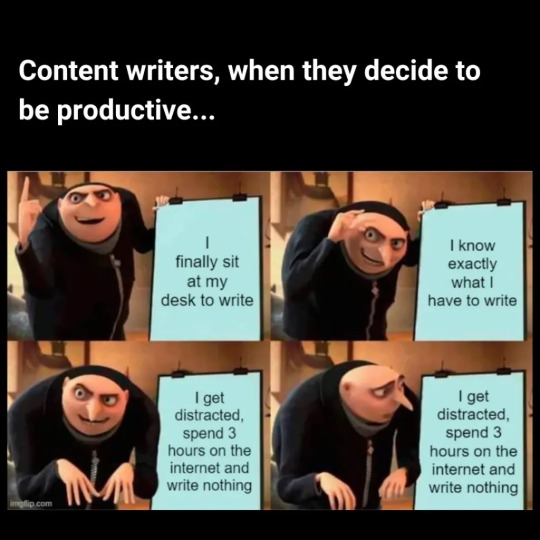
Another writing meme! Let me know if you relate.
#women writers#books#wattpad#writing#thriller#writers on tumblr#books and reading#bookworm#book review#writerscorner#writing encouragement
303 notes
·
View notes
Text
Rebecca Roque’s “Till Human Voices Wake Us”
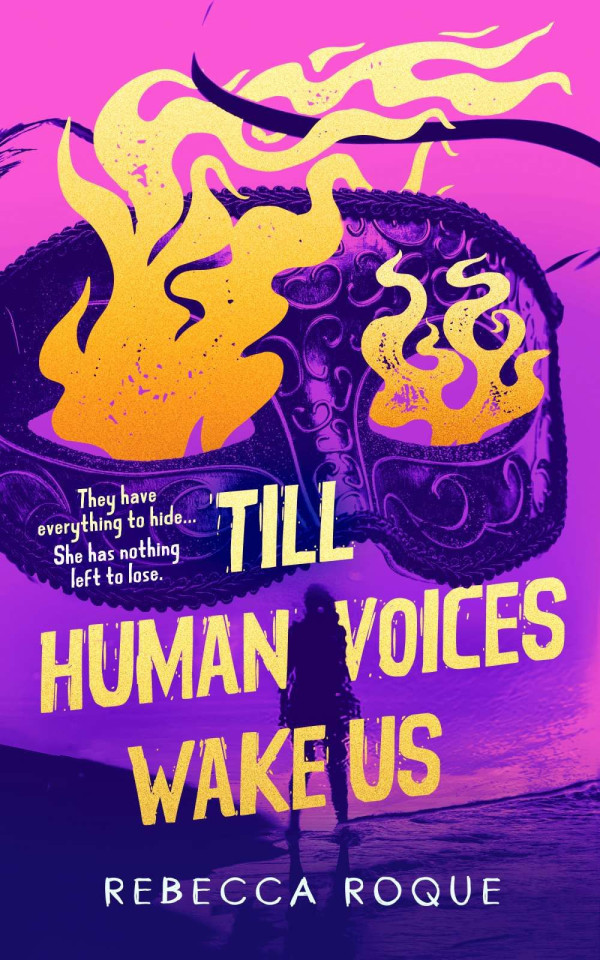
I'm touring my new, nationally bestselling novel The Bezzle! Catch me in TOMORROW (Apr 17) in CHICAGO, then Torino (Apr 21) Marin County (Apr 27), Winnipeg (May 2), Calgary (May 3), Vancouver (May 4), and beyond!

"Till Human Voices Wake Us" is Rebecca Roque's debut novel: it's a superb teen thriller, intricately plotted and brilliantly executed, packed with imaginative technological turns that amp up the tension and suspense:
https://www.blackstonepublishing.com/till-human-voices-wake-us-gn3a.html#541=2790108
Modern technology presents a serious problem for a thriller writer. Once characters can call or text one another, a whole portfolio of suspense-building gimmicks – like the high-speed race across town – just stop working. For years, thriller writers contrived implausible – but narratively convenient – ways to go on using these tropes. Think of the shopworn "damn, my phone is out of battery/range just when I need it the most":
https://www.youtube.com/watch?v=XIZVcRccCx0
When that fails, often writers just lean into the "idiot plot" – a plot that only works because the characters are acting like idiots:
https://en.wikipedia.org/wiki/Idiot_plot
But even as technology was sawing a hole in the suspense writer's bag of tricks, shrewd suspense writers were cooking up a whole new menu of clever ways to build suspense in ways that turn on the limitations and capabilities of technology. One pioneer of this was Iain M Banks (RIP), whose 2003 novel Dead Air was jammed with wildly ingenious ways to use cellphones to raise the stakes and heighten the tension:
https://web.archive.org/web/20030302073539/http://www.wired.com/wired/archive/11.03/play.html?pg=8
This is "techno-realism" at its best. It's my favorite mode of storytelling, the thing I lean into with my Little Brother and Martin Hench books – stories that treat the things that technology can and can't do as features, not bugs. Rather than having the hacker "crack the mainframe's cryptography in 20 minutes when everyone swears it can't be done in less than 25," the techno-realist introduces something gnarlier, like a supply-chain attack that inserts a back-door, or a hardware keylogger, or a Remote Access Trojan.
Back to Roque's debut novel: it's a teen murder mystery told in the most technorealist way. Cia's best friend Alice has been trying to find her missing boyfriend for months, and in her investigation, she's discovered their small town's dark secret – a string of disappearances, deaths and fires that are the hidden backdrop to the town's out-of-control addiction problem.
Alice has something to tell Cia, something about the fire that orphaned her and cost her one leg when she was only five years old, but Cia refuses to hear it. Instead, they have a blazing fight, and part ways. It's the last time Cia and Alice ever see each other: that night, Alice kills herself.
Or does she? Cia is convinced that Alice has been murdered, and that her murder is connected to the drug- and death-epidemic that's ravaging their town. As Cia and her friends seek to discover the town's secret – and the identity of Alice's killer – we're dragged into an intense, gripping murder mystery/conspiracy story that is full of surprises and reversals, each more fiendishly clever than the last.
But as good as the storytelling, the characterization and the mystery are, Roque's clever technological gambits are even better. This book is a master-class in how a murder mystery can work in the age of social media and ubiquitous mobile devices. It's the first volume in a trilogy and it ends on a hell of a cliff-hanger, too.

If you'd like an essay-formatted version of this post to read or share, here's a link to it on pluralistic.net, my surveillance-free, ad-free, tracker-free blog:
https://pluralistic.net/2024/04/16/dead-air/#technorealism
77 notes
·
View notes
Text


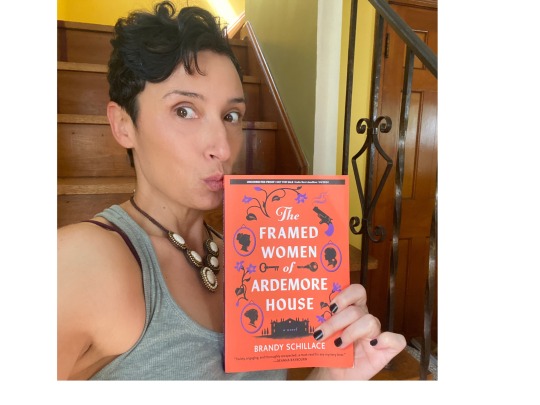

First novel!
UNBOXING! With my cat Darwin to help. Just got the ARC for my book (coming out with Harper Collins this winter). It’s a mystery novel—sort of gothic, with murder and crumbling estates—and the protagonist is neurodivergent! (I’m autistic, myself). Ready for an openly ND citizen-detective? Message me if you’d like an ARC (I have 25 of them). Preview video on my YouTube https://youtu.be/ryJC_w-orzo?si=mXX36CE46wqrcI88
youtube
#book reviews#booksbooksbooks#books#bookblr#books and reading#mystery#thriller#gothic#author#neurodivergent#neurospicy#neurodiversity#being autistic#actually autistic#autism#autistic author#detective#cozy mystery#Youtube
372 notes
·
View notes
Text

#thriller books#books and reading#books#books & libraries#booksbooksbooks#book blog#book quotes#book recommendations#bookaholic#book review#booknerd#bookshelf#horror books
171 notes
·
View notes
Text
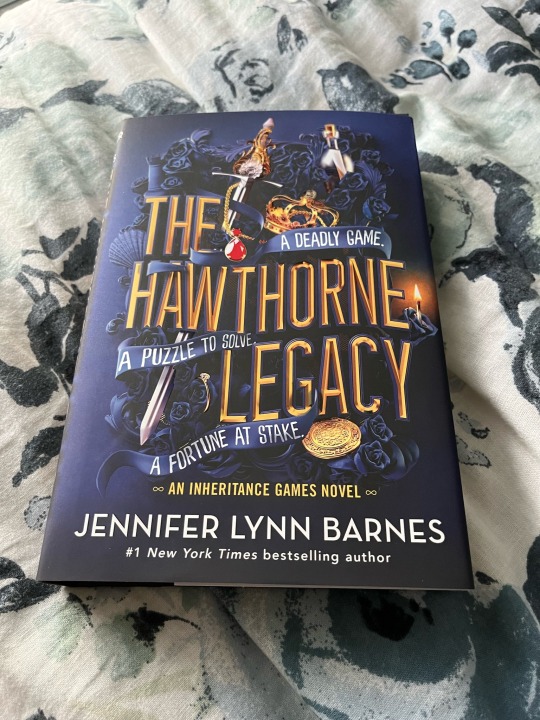

It was starting to sink in that for the rest of my life, the people I met, the people I became close to—there would always be a chance that they saw me as a payout.
#reading#books read in 2024#bookblr#books#book photography#book blog#bibliophile#books reading#books and reading#the hawthorne legacy#jennifer lynn barnes#the inheritance games#inheritance games#averygrayson#averyjameson#avery grambs#nash hawthorne#xander hawthorne#grayson hawthorne#jameson hawthorne#ya mystery#ya thriller#inheritance#avery kylie grambs#tobias hawthorne#this was awesome#i love this series#review#four stars#april reads
30 notes
·
View notes
Photo

Cover llustrations for the New york Times Book review about the Stephen King review of "All the Sinners Bleeds" by S. A Cosby. Thank you so much AD James Blue and Alvaro Dominguez
#editorial illustration#new york times#book review#stephen king#s a cosby#pencil drawing#digital color#thriller#west virginia#small town
118 notes
·
View notes
Text

Honestly? 100% accurate. This may not be the most rave review my book has gotten so far, but it's definitely one of my favorites. Read the whole thing here.
#the shabti#ghost stories#historical fantasy#queer fiction#2024 debuts#ancient egypt#lgbtqia books#writing community#supernatural thriller#my art#goodreads review#hermann goschalk#gay character#jewish characters#m/m romance
28 notes
·
View notes
Text
Can You Just Die, My Darling? - By Kaname Majuro (9/10)
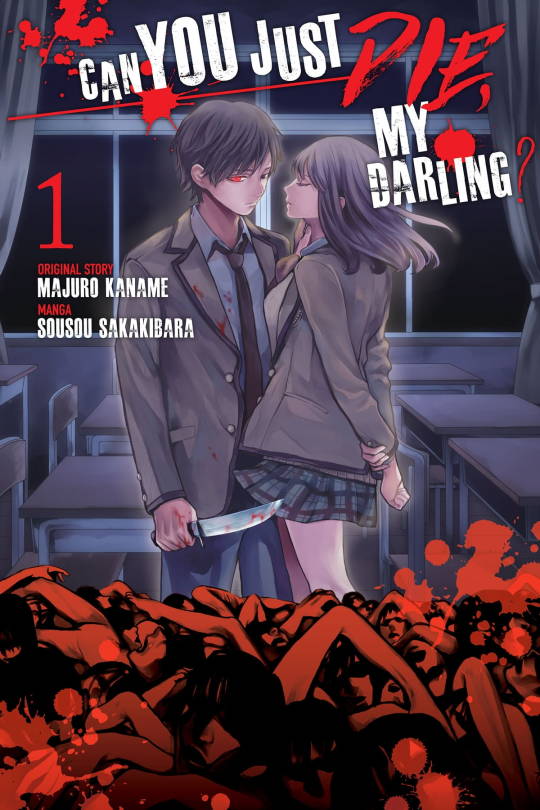
I have great news! This is available to purchase for real. Not just as an ebook or on an app. You can buy it in English and own it. Hooray, and also this is an incredibly unique yandere apocalypse style story. Regular thriller fans and yandere fans will love it.
ID is a horrible disease that gives the victim super strength. It makes the victim feel more uninhibited. Violent. Deranged and sometimes lustful. Specifically when they are in love.

Kamishiro is the first victim of this disease that we meet. He's a stereotypical nice guy. He's in love with his childhood friend. That childhood friend, Hanazono, is trying to rekindle their friendship. Kamishiro is initially happy, but then it happens. He almost stabs her multiple times. He starts to daydream about killing her. He snaps at her to push her away.

His strange behaviour just makes her worry more. Hanazono is a stereotypical popular girl. Everybody thinks Kamishiro should be honored to have her attention. He is branded as a weirdo for avoiding her.
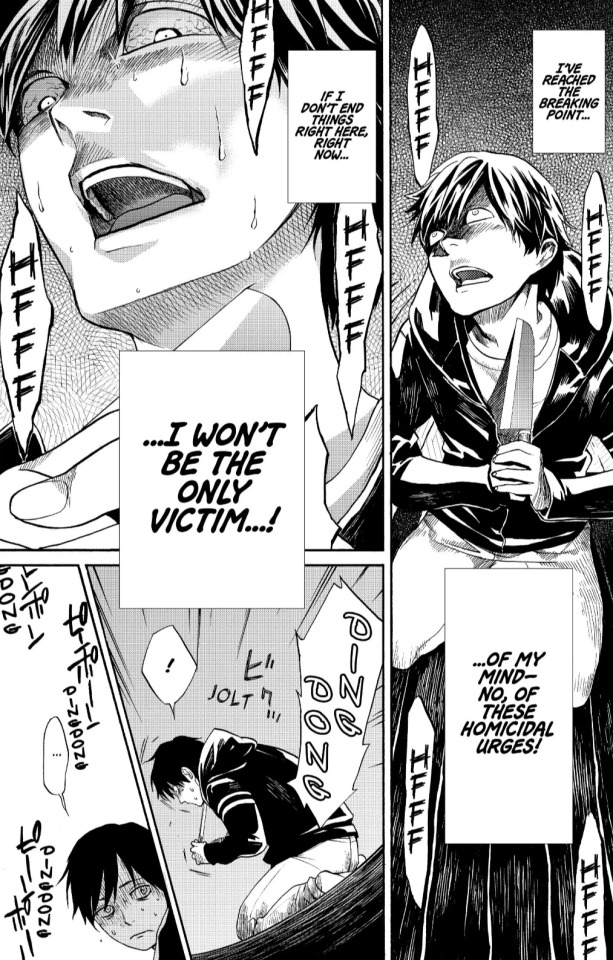
It gets dark really quick. Kamishiro is willing to do anything to stop himself. He even thinks about killing cats to satisfy his needs, but it doesn't work. Nothing does. He is always thinking of Hanazono. His prey and love.
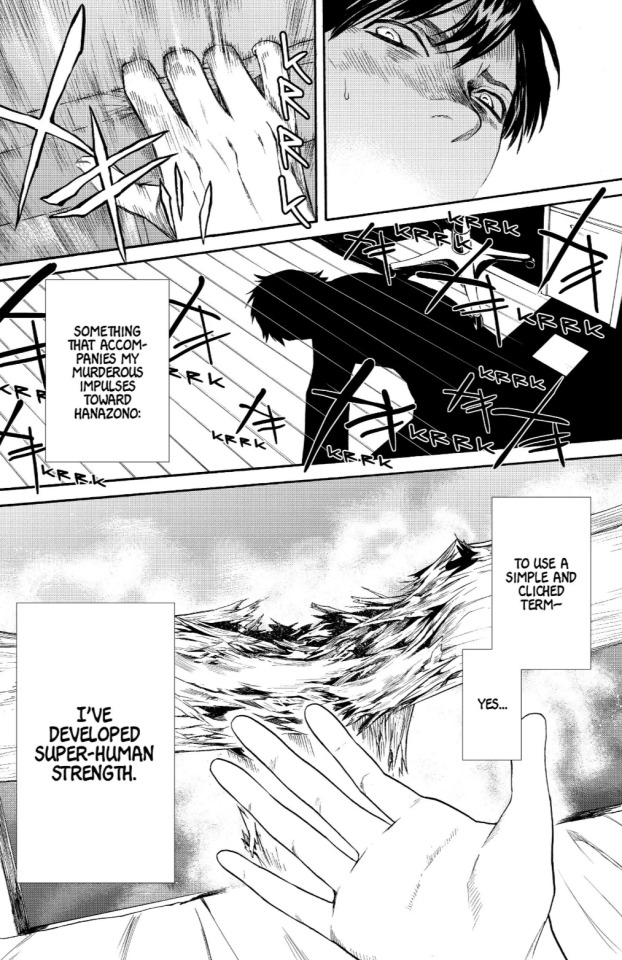
By the way the super strength is a huge plot point. The yandere disease is a huge potential source of misery. It literally makes the victims strong enough to rip up cars and buildings.
Scary.
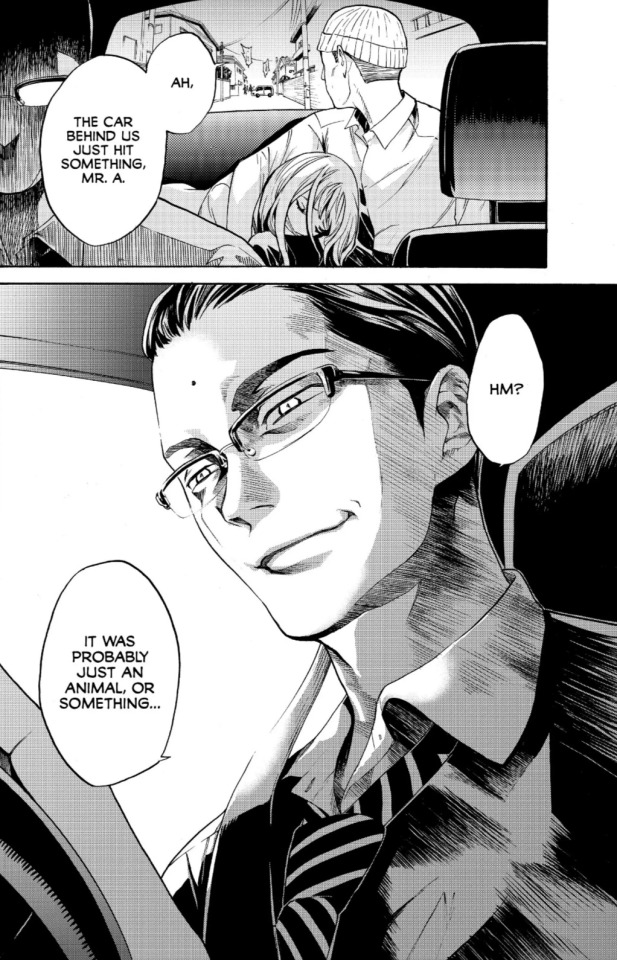
A teacher is the first villain. Warning. The sexual side of this disease and the villains are super dark. This is a thriller. It's only kind of a romance. The romance is the payoff after alot of pain. The end goal is finding a cure for the disease before the country is torn apart by lovers in love, and stalkers in lust.
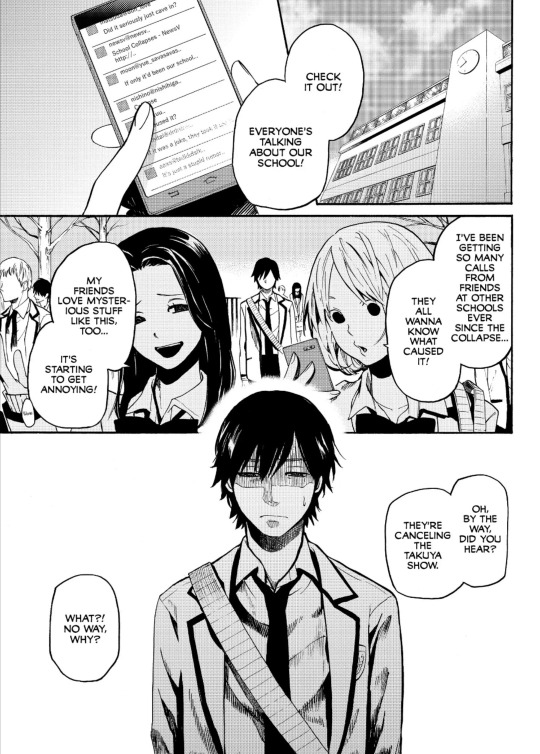
My favorite part of this series is the in between. Everyone affected by ID tries to be normal. They try to stay sane in public so they can continue their daily lives. It's painful and awful and awkward and the hallucinations about killing are gory.

The other characters and enemies are also unique. Love isn't black and white here. I really highly recommend this one. It's just a good manga series. It doesn't just exist to fulfill your yandere fix.
#yandere#male yandere#yandere male#yandere boy#recommendations#recs#rec#recommended#webtoon#horror#thriller#manga review#book review
264 notes
·
View notes
Text
“There is nothing wrong with the love of Beauty. But Beauty, unless she is wed to something more meaningful—is always superficial.”
— Donna Tartt, The Secret History
#donna tartt#the secret history#keep reading#bookguide#currently reading#new books#aesthetic#quotes#bibliophile#book blog#book summary#book review#murder mystery#mystery#thriller#dark academia books#dark academia#light academic aesthetic#light academia
24 notes
·
View notes
Text

Writers meme!
#women writers#books#wattpad#writing#thriller#writers on tumblr#books and reading#book review#booklr#writerscorner#writer memes
62 notes
·
View notes
Text
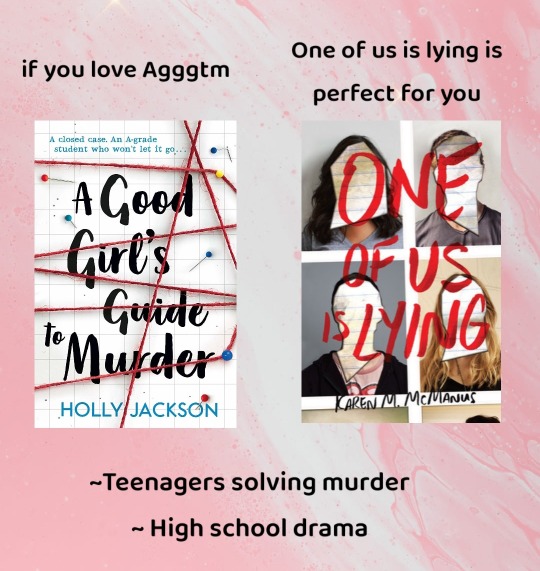
Books recommendation 📚😇😊🥰
#2024#book lover#bibilophile#booklr#bookblog#book reccs#book recommendations#book review#agggtm#a good girls guide to murder#one of us is lying#books worth reading#bookish love#bookish#bookism#bookporn#books and coffee#cozy mystery#young adult thrillers#mystery books#bookstagram#booktok books
14 notes
·
View notes
Text
𝐑𝐞𝐯𝐢𝐞𝐰𝐢𝐧𝐠 "𝐀 𝐆𝐨𝐨𝐝 𝐆𝐢𝐫𝐥'𝐬 𝐆𝐮𝐢𝐝𝐞 𝐓𝐨 𝐌𝐮𝐫𝐝𝐞𝐫" 𝐛𝐲 𝐇𝐨𝐥𝐥𝐲 𝐉𝐚𝐜𝐤𝐬𝐨𝐧
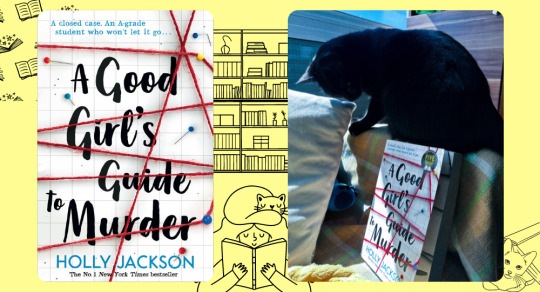
“I’ve already learned my lesson here: when you catch someone lying about a murdered girl, you go ask them why.”
Title A Good Girl's Guide To Murder
Author Holly Jackson
Genre Mystery; Thriller; YA
Pages 433
THIS REVIEW HAS A COUPLE OF SPOILERS, NOTHING TOO SIGNIFICANT.

Hello fellow readers! What I have in my paws today is a review of "A Good Girl's Guide To Murder" by Holly Jackson! This is a YA mystery-thriller with a lot of twists and turns, investigation entry logs, maps, etc, which allow you to get into the whole investigative vibe!
Reading Flow ★★★★★
Writing ★★★★★
Plot ★★★★
Characters ★★★★
Spicy none
“But sometimes remembering isn’t for yourself, sometimes you do it just to make someone else smile. Those lies were allowed.”

Goodreads rating 4.33★
My rating 4.5★
This one had me hooked asf. I went from not wanting to put it down, to reaching the final chapters and not wanting to continue it because I was enjoying myself too much to finish it. 😂
*SPOILER ALERT* I really enjoyed the whole plot and was excited for most of it but I was a little sad and confused with Barney's death. I don't think it was necessary and it actually bummed me out quite a lot.
Aside from that I really was at the edge of my seat at the end of each chapter as the investigation got more and more captivating, I just HAD TO KNOW what happened and so I found it a very easy-to-read book because it flows naturally. It mentions various subjects like mental health, substance use, sexual assault and at some point even racism. It has romance happening in the background but it's never the focus and aside from the characters interactions you don't see much mention of it.
“He kissed her, and she glowed with that feeling. The one with wings. “You bring the rain down on them, Pip.” “I will.”

This book will have a tv show adaptation some time soon! Shooting has already wrapped up yet we don't have a date yet. I'm both excited and scared for this because, well, we know how hard it is to capture a book's magic and expectation, but at least it's not a movie. I think it has more potential if we have several episodes to explore the story.
“women can be just as dangerous as men.”
Anyway, if you made it this far thank you for reading this review! I'll leave you with the synopsis if you'd like to take a look, as well as it's Goodreads link. See you soon! 𓃠
If you'd like, follow Oli's instagram page!

SYNOPSIS
https://www.goodreads.com/book/show/40916679-a-good-girl-s-guide-to-murder
Everyone in Fairview knows the story.
Pretty and popular high school senior Andie Bell was murdered by her boyfriend, Sal Singh, who then killed himself. It was all anyone could talk about. And five years later, Pip sees how the tragedy still haunts her town.
But she can't shake the feeling that there was more to what happened that day. She knew Sal when she was a child, and he was always so kind to her. How could he possibly have been a killer?
Now a senior herself, Pip decides to reexamine the closed case for her final project, at first just to cast doubt on the original investigation. But soon she discovers a trail of dark secrets that might actually prove Sal innocent . . . and the line between past and present begins to blur. Someone in Fairview doesn't want Pip digging around for answers, and now her own life might be in danger.
#bookblr#booklr#book quotes#reading#readers#book rec#books#book review#amreading#booklover#bookaddict#bookshelf#bookshelves#book photography#goodreads#cat#black cat#what to read#book club#olireads#agggtm#a good girls guide to murder#mystery#thriller#mystery thriller#ya books#ya thriller#ya mystery
10 notes
·
View notes
Text
Book Review 31 – An Unauthorized Fan Treatise by Lauren James
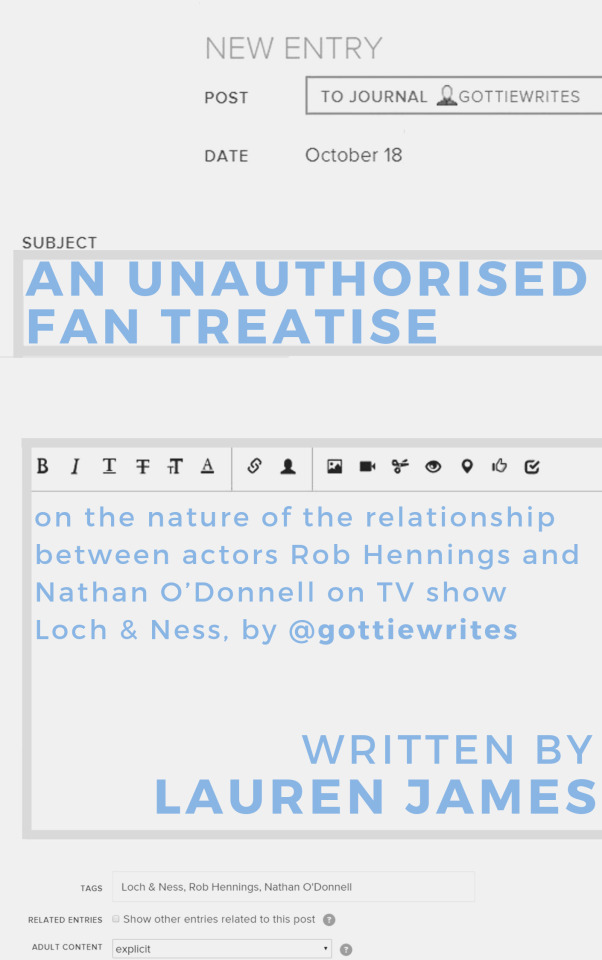
This was a book (or, web fiction piece. Web serial? I’m not actually sure how it was initially released) that I read basically on a lark after getting curious seeing a few people talk about it on tumblr. So, score one for viral marketing and the convenience of reading free webfiction, I suppose – I was up until half past three in the morning barrelling through it all in one sitting. Which is all just incredibly appropriate for this story in particular.
So, the story’s a thriller/murder mystery, but specifically one about the actors on a trashy CW-style hot-young-adults-playing-supernatural-creatures-having-teen-drama style tv show, as told in the form of a sprawling series of essay-length posts by a fan devoted to proving that the two male leads are fucking in real life but forced to hide their live by the homophobic network. Things get more tangled from there.
So, as I said, very appropriate that I learned about this on tumblr. Basically everything about it is about online fan culture – there’s tens of thousands of words devoted to recounting livejournal sockpuppet drama, every chapter ends with a ‘comment section’ that’s mostly a Greek chorus but occasionally relevant to the plot, and almost literally every single aspect of the story and framing are a reference or pastiche to some famous online clusterfuck or other of the kind you’ve probably watched far-too-long video essay retrospectives of on youtube. Or I have, anyway (but then again, ninety percent of the references were a bit before my time anyway, so the cultural education was pretty crucial to me understanding what this was going for at all).
And, given all that, I ultimately found this pretty disappointing? It was absolutely readable, and enjoyable in the moment, but the metatextual commentary element meant the thriller plot at the heart of it just ended up seeming like, well, cheap soap opera. Beyond that, the framing device just seems like one giant missed opportunity, the commentary on fandom culture was in the end pretty shallow, and the shocking twist in the epilogue was, I think, just a mistake.
So okay, lets justify all of that in order.
When I say the plot didn’t really hold together for me, that might be more the fault of the word-of-mouth marketing that pointed me towards the story more than any promises the text itself makes, honestly. But I went in expecting a story about fan obsession and hallucination, projection and parasocial relationships, and all that. And downstream of that, I was expecting something a bit grounded? And the story just wasn’t either of those things; to begin with, the two celebrities the ‘fan treatise’ is about really are secretly dating and being forced to hide it, which seemed like kind of inexplicable decision to me as I read it. It’s not just that, either. Like to be clear this story absolutely has an unreliable narrator, but for a story ostensibly about fan obsession, it seems a bit odd for, lik, there to be an extended digression about how a famous actor was totally of an asshole in a livejournal fanfic community a decade previously, and then have that be revealed to be totally and unambiguously correct.
It’s less of an issue, but as I said the actual murders and intrigues at the core of the story are kind of just..ridiculous? Which I honestly normally wouldn’t mind, but- wen your story spends so much time talking about trashy supernatural tv shows and fanfic, it becomes kind of important that the ground-level narrative seem real by comparison, you know? And this had altogether too much talk of ‘the dark web’ for that.
I’m very possibly going to be putting my foot in my mouth hear (most of the specific fan cultures and pieces of drama being referenced, I only really know second hand through various salacious youtube gossip rags), but for all that the entire story’s utterly preoccupied with, in the end I found the commentary on fan culture really..shallow? Sure, the entire premise is having a laugh at larry stylinson-style RPF shipping conspiracies, the entire livejournal plot is a pastiche of the MsScribe drama, there are plenty of jokes about how m/m shippers literally forgetting about te female lead in te show she headlines, etc, etc. And they’re, largely, well-done references and jokes! Not really complaining about that.
But I’m kind of left feeling like there’s nothing really underneath it all. Which- if James had sat down a story with the explicit purpose of Saying Something About Fandom, it would almost certainly have been terrible. But between the murder plot and the revelations of Gottie’s byzantine revenge scheme (which honestly I’m consciously choosing not to think about too hard lest this just turn into cinemasins-for-books), in the end all the fandom stuff almost felt like window dressing? Elaborate, detailed, and impressive window-dressing, to be sure, but as the story went on and the plot became more clearly thriller-ish, increasingly revealed to be surface level and ornamental.
Speaking of ‘surface level’: the web serial medium and use of links here was such an incredible missed opportunity. You have an utterly unreliable narrator with a secret agenda and a grudge writing tens of thousands of words of livejournal essays about celebrities, and then you go to the effort of making actual accounts on twitter/insta/whatever to leave real links to when you cite them, and then you have her actually faithfully relate what the cited paged say? What a waste! This would have been so much better if it was 50% more postmodern and up its own ass about playing with the format. And doing so would even let you have that (incredibly obvious on one level, entirely out of nowhere and dramatically dead when it’s dropped as the literal last word of the story) reveal in the epilogue actually work!
Anyway, this all sounds incredible negative. Which isn’t entirely inaccurate, honestly, but I should reiterate that I googled this out of idle curiosity on a Friday evening and only realized it was 3am when I finished it. The negativity is more because this seemed so close to being amazing than because it was anything heinous.
43 notes
·
View notes
Text
The Last Murder at the End of the World by Stuart Turton
This book had a very interesting premise. The story follows an island at the very end of the world - a fog has taken over the rest of the planet, and the island is populated with some people who have found a way to keep the fog at bay. However, a murder occurs which sets into motion the fog coming for the rest.
The book was interesting and unique, unlike most other books I've read recently. The story was engaging, the twists were unexpected, and it was hard to predict what would occur next. I liked it because it was definitely different, and given many books nowadays, that is generally hard to come by.
I would recommend this as something for anyone who enjoys a good thriller but is tired of formulaic writing, and predictable endings. At no point during this book did I have any idea what would come next. Highly recommend!
#booklr#reading#books#netgalley#book recommendations#book reviews#fiction#book review#bookstagram#thriller#the last murder at the end of the world#stuart turton#mystery
14 notes
·
View notes